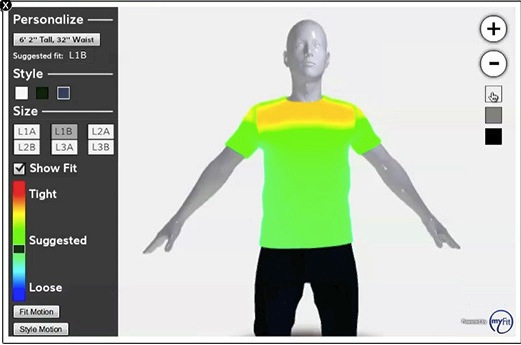Today in t-shirt startups, a New York operation called Threadmason has launched a Kickstarter to use 3D modeling to create basic shirts that fit guys really, really ridiculously well. If Bonobos got its business of the ground by focusing on fit, Threadmason is aiming to one-up that standard by offering their wares in 24 different sizes, ensuring that at least one of them makes you look like Ryan Gosling on an off day.
After the user manually inputs his height, weight, and waist size, Threadmason generates a 3D avatar to show how different sizes will fit. It looks like a heat map, with different colors marking tight and loose spots. The site serves up a recommended size, but users can click through other sizes to see how the fit changes.
“If a guy has a smaller waist but is heavier, that means the weight is in the upper part of his body,” co-founder Vincent Ko said. “If he’s average weight but has a wide waist, he has big hips.”
Threadmason is one of a growing number of startups trying to crack the fit equation (or, rather, algorithm). Stantt, another startup that launched a Kickstarter this summer, used pre-existing body scan data to generate better sizes for guys without requiring them to input their own measurements. Last April, the London-based Fits.me raised $7.2 million to expand the presence of its virtual fitting room technology throughout Europe and into the US. Clothes Horse, meanwhile, helps people figure out the best fit for them on third-party retailers’ sites.
The plus size women’s marketplace Abbey Post asks users to take a photo from the front and side in order to generate dozens of data points in order to make recommendations on clothing styles. Meanwhile, the traveling suiting startup Arden Reed implemented a 3D body scanner in a refurbished ice cream truck to take men’s measurements on the spot.
Threadmason’s three-measurement formula is certainly less specific than either of those last two, but t-shirts are a relatively forgiving medium and 24 options provides a lot of room to get it right.
Ko and his co-founder Jake Huston acknowledged that stocking 24 different sizes is an inventory risk, so the team is planning on using their Kickstarter campaign as a way to accumulate data on the most popular sizes, which will feed their core supply.
The price point hits at about $35, putting it on par with retailers like Bonobos and Banana Republic. Yes, that’s more than a lot of guys would otherwise spend on a t-shirt, but it’s 100% organic cotton! Made in America! Look, some people will definitely pay for this. I’d probably encourage my brother to, since he’s 6’3″, lanky, and has yet to find a shirt that’s not too baggy or too short.
To an extent, every clothing startup has to sell itself on an improvement in some dimension, be it customization, ease of purchase, better quality, better price, or fit. When it comes to body scanning and avatar creation, it still remains to be seen what will become a practical, non-kitschy part of the shopping experience, and how that might be translated into a more mainstream retail setting..
